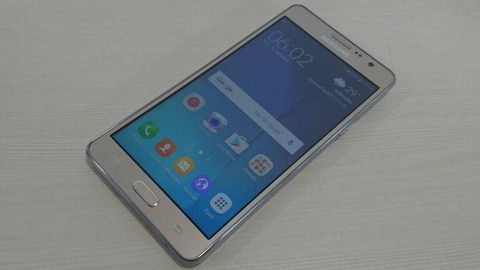TechRadar Verdict
The Samsung Galaxy On 7 Pro is average at best, and does little to differentiate itself from the competition. There are far better options in the form of the Moto G4 or the Xiaomi Redmi Note 3.
Pros
- +
Great battery life
- +
Above average and snappy rear camera
- +
Decent Screen
- +
S Bike mode can be useful for some
Cons
- -
Uninspired and boring design
- -
Questionable build quality
- -
Lacks basics like the ambient light sensor
- -
Mediocre performance
- -
Poor front camera
Why you can trust TechRadar
Design: 3/5
Features: 3/5
Performance: 3.5/5
Usability: 3.5/5
Value: 3.5/5
The Samsung Galaxy On 7 Pro is a revised version of the Galaxy On 7 launched in 2015.
Galaxy On 7 pro has 2GB RAM as compared to 1.5GB of the regular On 7 and it also doubles the internal storage to 16GB. What else is different that makes this device worthy of the Pro moniker? Well, nothing else.
This is clearly another example of Samsung's penchant of making too many smartphones and adding or removing one feature here or there to differentiate it from its other similarly priced devices.
The Samsung On 7 pro was launched alongside the On 5 Pro, just 2 days after Samsung unveiled the Galaxy J2 2016 and the Galaxy J Max.
Thus in the price range of 8,000 - 12,000 rupees, Samsung has a grand total of EIGHT devices - the Galaxy J2, the Galaxy J2 2016, the Galaxy J3 2016 , the Galaxy On 5, the Galaxy On 7, the Galaxy On 7 Pro, the Galaxy On 5 Pro and the Galaxy J Max.
Utter Madness.
The On 7 Pro also comes with Samsung's S Bike Mode, which Samsung introduced in last year's Galaxy J3.
The smartphone, priced at Rs 11,190, finds itself in a heavily saturated and competitive marketplace, populated by the likes of the recently launched Moto G4, the slightly more expensive Moto G4 Plus, the LeEco Le 1s Eco, the Redmi Note 3 and the Asus Zenfone 2.
Does Samsung's new budget competitor have what it takes to battle it out with these segment heavyweights? Let's find out
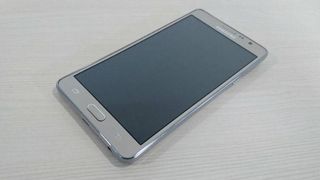
Display : 5.5-inch 720p HD Super AMOLED display
OS : Samsung's TouchWiz UI running atop Android 6.0.1 Marshmallow
CPU : 1.2GHz Snapdragon 410
RAM : 2GB
GPU : Adreno306
Storage : 16GB internal storage, microSD support
Cameras : 13MP rear camera (LED flash), 5MP front camera
Connectivity : Wi-Fi, 3G/4G/2G, GPS, Bluetooth, microUSB 2.0, NFC
Battery : 3,000mAh
Dimensions : 152 X 78 X 8.0 mm
Weight : 172 grams
Price : Rs 11,190
For many years, Samsung was known for making plasticky handsets with mediocre build quality and uninspired designs. Then came the Galaxy S6 and the Galaxy S6 Edge which ushered in a svelte metal and glass design that stunned many.
From the days of the ungainly and bulky Galaxy S5, Samsung transformed it's ugly duckling into a beautiful swan with the Galaxy S6.
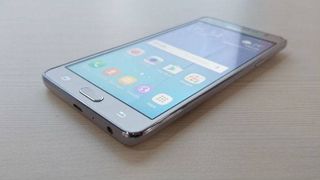
Now you will be asking why I am talking about the flagship Galaxy in an article reviewing the On 7 Pro.
That's because even though Samsung has made serious headways when it comes to design in its flagships, the same cannot be said for its low and mid-range devices.
Some attempts have been made by Samsung in the form of the metal infused A series and the inclusion of a metal ring around the sides and a textured back on the On 7 Pro.
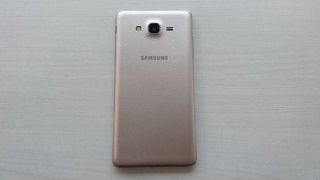
The texture on the back looks incredibly tacky and tries to emulate a leather like finish. In the gold variant that we got, this finish looks especially cheap and garish.
With the competition seriously stepping up its game when it comes to build quality and design, the Samsung Galaxy On 7 Pro looks insipid, tacky and boring.
The build quality of the device is also nothing to write home about. The plastic construction doesn't inspire much confidence and feels rather cheap. The metal strip around the sides does add a little bit of personality though, and makes the device rank a notch higher than the J2 and J3.
The back is removable and is very smooth and slippery. As with every Samsung budget smartphone, the quality of the removable back panel is extremely poor. Just like the back panel found on the Samsung Galaxy J5 and Galaxy J7, it feels like it will break with just a modicum of force.
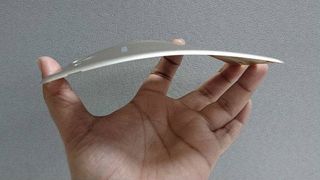
The removable back comes with the usual advantages of having a removable battery and easy access to the two SIM card slots and the microSD card slot.
The volume and power keys are a bit on the small side and are very hard and clicky. They are also recessed way too much, making them hard to press.
The single external speaker unit, located next to the rear camera unit, is loud enough, but sounds muddled and tinny at full volume. The earpiece is great though and calls made through the phone could be heard loud and clear.
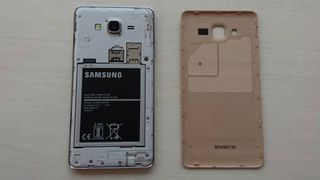
Samsung needs to realise that the market landscape has changed drastically, with the introduction of Chinese brands who have helped push the envelope forward when it comes to design and build quality.
It's high time Samsung stops riding on the wave of its brand name and starts taking the design and build of its lower end devices seriously.
On the connectivity front, the Samsung Galaxy On 7 Pro is a dualSIM device that supports 4G LTE, 3G, Wi-Fi 802.11 b/g/n, Bluetooth V4.1 and GPS. It comes with a proximity sensor and an accelerometer.
The Samsung Galaxy On 7 Pro lacks basic features which became commonplace on smartphones years ago like the ambient light sensor and a secondary noise cancelling microphone.
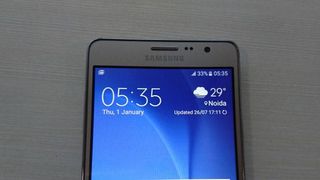
I fail to understand why Samsung refuses to equip their budget and mid-range smartphones with these, as they would cost the company next to nothing.
Not having an auto brightness sensor, noise cancelling microphone and haptic feedback is just inexcusable in 2016.
The Samsung Galaxy On 7 Pro also lacks a notification LED, which was slightly excusable in the Samsung Galaxy J2 2016, thanks to the Smart Glow feature. But on the On 7 Pro, the lack of the same really irks.
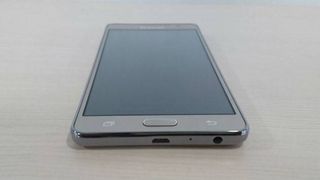
At the price, the lack of a fingerprint sensor is not that much of a deal breaker, but shouldn't we expect the best from the leading smartphone manufacturer? Smartphones such as the Coolpad Note 3 and LeEco Le 1s come with a fingerprint sensor in the same price range.
Another disappointment is the lack of NFC, something which can be found in the Samsung galaxy J3, which is cheaper at Rs 8,499.
The Samsung J series, regardless of its many shortcomings, does redeem itself when it comes to the display as they feature Samsung's trademark sAMOLED screens, which bring with them ultra-vivid colours and inky deep blacks.
The Samsung galaxy On 7 Pro on the other hand, doesn't come with an sAMOLED panel, and makes do with a 720p HD IPS display.
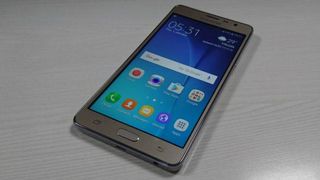
While this is not an outright negative, as IPS panels have more realistic and neutral colours and better viewing angles, one does miss the sheer vividness and 'pop' of an AMOLED panel.
The display is more than serviceable though, with good viewing angles and great brightness level. Colours, as mentioned above are par for the course, although whites do have a pinkish tinge.
Of course due to the lack of an auto brightness sensor, you would have to manually increase the brightness every single time you go outside. Samsung has included something called an outdoor mode, which can be activated by a toggle that sits right next to the brightness bar in the quick setting toggle.
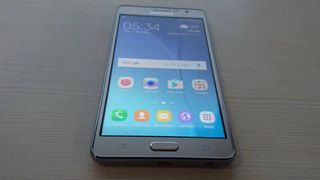
This outdoor mode maximises the display's brightness for a period of 15 mins, after which the brightness reverts back to the previous setting.
This outdoor mode is well and good, but it's need is necessitated only because of Samsung's reluctance to include a basic sensor.
Overall, the Samsung Galaxy On 7 Pro has a very serviceable display, with no major shortcoming as such. However, the display doesn't do much to excite either, and doesn't stand out amidst the crowd.
The Samsung Galaxy On 7 Pro is powered by the Qualcomm Snapdragon 410 clocked at 1.2GHz coupled with a Adreno 302 GPU, 2GB of RAM, 16GB internal storage (expandable via a microSD card slot) and a 3,000mAh battery.
As with the rest of the smartphone, Samsung has played it very safe with the hardware inside the Galaxy On 7 Pro. The Snapdragon 410 is a very reliable, albeit dated processor, and the Adreno 303 GPU is again, solid but wont set benchmarks on fire.
2GB of RAM is a nice step up from the On 7, though the device does suffer a bit from memory management issues.
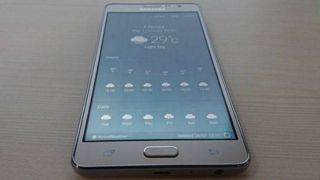
The Samsung Galaxy On 7 Pro does a decent job of handling daily tasks, and handles casual use such as web browsing, scrolling through photos and lists, taking pictures etc. without any major problem.
However, some random lag and stutters do creep in and the smartphone just doesn't feel as snappy as it's competition.
Because of the lowly 720p resolution display, the gaming performance of the device is more than adequate for the price. With the GPU and the CPU having much less pixels to push, even intensive games like Asphalt 8: Airborne, Real Racing 3 and Modern Combat 5 play without any hassle, albeit at a lower resolution.
The Samsung Galaxy On 7 Pro runs on Samsung's own TouchWiz UI running atop Android 6.0.1 Marshmallow.
Doze mode, application permission control and all other Marshmallow goodness is on offer here, just with a heavy handed dash of Samsung's customisation.
Samsung over the years has tried to de clutter and simplify TouchWiz, removing a lot of unnecessary and gimmicky features. But still, especially after using the Moto G4 Plus, TouchWiz seems a bit incoherent and messy.
Samsung has opted for a horizontal scrolling app drawer in which applications can be arranged alphabetically or as per the wish of the user. Out of the box, the quick notifications tray has 18 icons, which thankfully are user customisable and can be whittled down to a more reasonable size.
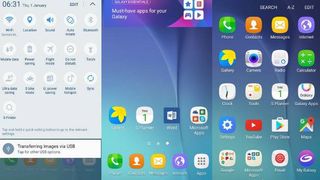
Long pressing the home button opens up Google Now and a double press leads to the camera app instead of Samsung's rarely used S Voice. It's good to see Samsung finally ditching S Voice for the much more popular and powerful Google Now.
Samsung has also added a feature called 'Smart Manager,' which is basically a tool to check the performance statistics of the device. You can check the battery status, storage space, memory used by applications etc. It also allows you to close apps running in the background, delete unused files and check for viruses.
Out of the box, the device comes with tons of pre loaded applications, including a while suite of Microsoft Applications, namely Word, Excel, PowerPoint, OneDrive, OneNote and Skype. Thankfully, these can be uninstalled.
The Device also comes with Samsung's own applications such as S Health, Galaxy Apps, its own browser, S planner and My Galaxy.
Flipboard is directly integrated into the OS and can be found in the leftmost home screen.

What is rather disappointing about TouchWiz is the amount of redundant applications on board. The device comes with three different applications for browsing the web out of the box - Chrome, the default browser and Opera Max. For photos as well, there's the Google's Photos app and Samsung's own 'Gallery' application.
On a positive note though, Samsung has worked hard over the years to optimise TouchWiz, and it shows, it is much more fluid and smoother than previous versions. And while, irritants and quirks very much remain, the overall experience has definitely improved over the years.
Samsung also includes a powerful theming engine, in a bid to compete with the extensive amounts of customisation offered by Chinese and domestic players.
Now lets talk about the the S Bike mode:
The Samsung Galaxy J2 2016 also comes with Samsung's much hyped S bike mode. The smartphone comes with a specialised NFC sticker/tag that sticks to the bike fuel tank.
The rider needs to switch on the S bike mode on the smartphone before setting off on the ride, and then tap the sticker with the handset.
Upon activation, the S bike mode mutes incoming calls and notifies the caller with an automated message that the user is riding a two-wheeler and cannot take calls at the moment. If however, the caller wants to convey a message urgently and cannot wait for the rider to call back, then he/ she has the option of redirecting the call by pressing 1 on their smartphone.

When the caller does this, the Samsung Galaxy J2 2016 notifies the rider that the call is urgent by playing a different ring tone. Now comes the best part, to prevent any accidents, S Bike mode will not let the rider attend the call until he halts the two-wheeler.
The implementation is good however we think that the idea of notifying the rider by just playing a distinct ring tone can be easily missed on noisy Indian roads. To make it more intuitive, Samsung could have added a LED light bulb on the NFC sticker/tag.
S Bike mode, while an interesting and unique initiative, seems to be just a gimmick, and not really an essential feature.
You can read more about the S Bike mode in our dedicated review here.
The Samsung Galaxy On 7 Pro comes with an 13MP rear camera with autofocus and LED flash and a 5MP front camera.
The rear camera is above average and in well-lit situations, produces sharp, vibrant images with vivid colours. In outdoor low light situations, images lack detailing and have a noticeable amount of noise.
The camera unit struggles a bit with artificial light, with the exposure level all over the place. The dynamic range is all a bit poor.
In indoor low light scenarios,the images produced have a lot of noise and tend to look muddy and distorted.
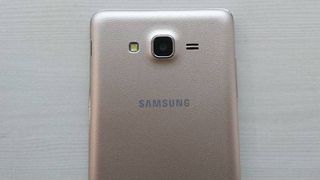
On a positive note though, the camera is extremely quick to focus and process images. Unlike the recently revised J2, the camera app is a breeze to use and is very fast and snappy.
1080p video shot by the rear camera is a nice surprise. While not comparable to high end smartphones, it is quite sharp and detailed, although it does suffer from the lack of optical image stabilisation.
The front shooter is a big disappointment, especially after the great front camera of the Galaxy J2. While this might be a defect with our review unit, the front camera cannot handle artificial light, and completely overexposes the image. The light sources show up blown up and as light trails.
Outdoor though, the front camera is above average and the wide selfie mode is a nice addition when wanting to take a selfie with more than 2-3 people in the frame.
Here are some camera samples:

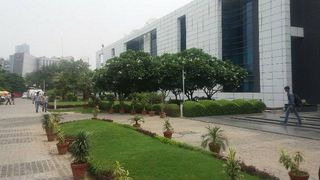



The Samsung Galaxy J2 is powered by a 3,000mAh battery unit which is quite great, to be honest. The device can make it through one day of moderate use easily, with more than 30 percent of the battery remaining.
Even intensive use sees the smartphone making it through the course of a single day.
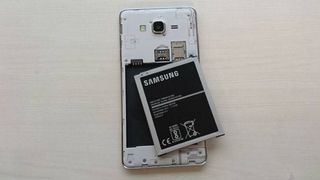
Samsung also has a rather nifty ultra-power saving mode, which applies a greyscale theme to your device.
The battery life of the smartphone is actually one of it's highlights and makes up for the rather middling internals.
The Samsung Galaxy On 7 Pro has a great battery life, an above average rear camera and a decent screen. S Bike Mode and Ultra Data Savings mode are useful, though a bit gimmicky.
The camera is very fast and snappy, and the camera application is a delight to use.
The Samsung Galaxy On 7 Pro has an insipid uninspired design, questionable build quality, lacks basics such as an ambient light sensor a secondary noise cancelling microphone and the performance, while not bad, is nothing extraordinary.
It also doesn't come with a fingerprint sensor, which is present is many of its competitors and the front camera is rather poor.
Out of the newly released smartphone by Samsung in this price range, the On 7 Pro is the best of the bunch. However, it is still average at best, and does little to differentiate itself from the competition.
The competition has realised the need for a premium experience even at this price range, something that Samsung needs to understand as soon as possible.
While the On 7 Pro is not a bad buy, there are far better options in the form of the Moto G4, the slightly more expensive Moto G4 Plus or the Xiaomi Redmi Note 3.
Features Writer at NDTV Gadgets 360. Past - Sub Editor at India Today Tech, Content Writer at TechRadar India.
A PG diploma holder in English Journalism from IIMC, New Delhi. Avid tech enthusiast, cinema buff, voracious reader and Formula 1 fanatic.
